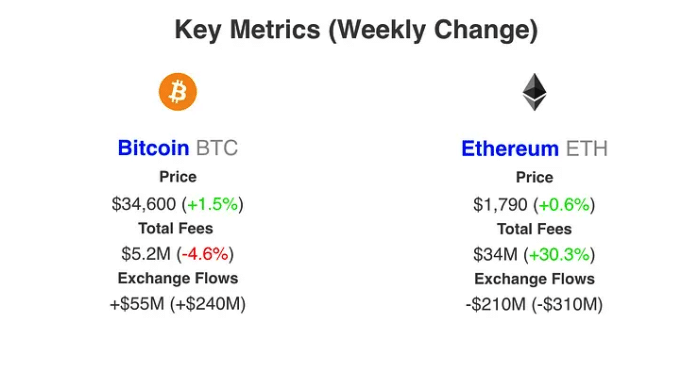Bitcoin
Bitcoin and Ethereum are finally handing over the baton, but to whom?
Although Ethereum made more in fees, the surge is connected to DeFi tokens’ trades rather than ETH. The decline in Bitcoin’s Open Interest also indicates organic demand for altcoins.

- Market players are overlooking BTC and ETH, taking riskier bets and focusing on lower-cap assets.
- Bitcoin Open Interest decreased while spot volume jumped.
Over the last seven days, the attention that Bitcoin [BTC] and Ethereum [ETH] had enjoyed in previous weeks fell. This inference was because Bitcoin traded sideways within the period, gaining 1.98%. ETH’s performance was also only a little better. Its value increased by 2.58% while trading at $1,834.
Realistic or not, here’s ETH’s market cap in BTC terms
However, the price action of both assets is not the only determining factor that their dominance has been dwindling. IntoTheBlock, in its 3 November Medium post, expanded on the metrics indicating a rotation in the market.
Eyes are on the new shining stars
According to the report analyzed by AMBCrypto, transaction fees on the Bitcoin network fell by 4.6%.
A hike in these fees suggests that there is high demand for BTC. On the other hand, a drop in it means otherwise. So, Bitcoin’s total fees decreasing to 5.2 million implies that the number of transactions decreased and volatility also shrunk.
In Ethereum’s case, total fees jumped. But that was not because there was high demand for ETH.
Instead, the crypto trading signal platform explained that the 30% jump could be linked to the hike in on-chain trading. This on-chain trading was that of tokens operating on the Ethereum network.
For those who don’t know, the Ethereum network is very different from Bitcoin.
On the Bitcoin network, tokens cannot be traded via a Decentralized Exchange (DEX). But Ethereum allows users to trade other ERC-20 tokens on DEXes like Uniswap [UNI]. Also, ERC-20 is the standard for creating smart contract tokens using Ethereum.
Furthermore, IntoTheBlock mentioned that L1 altcoins and DeFi tokens are now the stars of the market. For instance, cryptocurrencies like Cardano [ADA] gained 12% in the last seven days.
SushiSwap [SUSHI] jumped by an incredible 69%. There were also others with double-digit hikes.
This rotation is also a sign that the altcoin season may be around the corner. The report interpreted the data to mean that market players now have a riskier appetite. With respect to that, IntoTheBlock noted:
“Historically crypto cycles have followed the trend where Bitcoin leads the first surge, then Ethereum, with capital progressively being allocated to lower-cap and riskier bets.”
Bitcoin OI drops, but a rally may be on the way
Another ground supporting an altcoin season is the drop in Bitcoin Open Interest. Open Interest is a measure of market activity. A high open interest means that there are many market participants watching the market.
On the other end, a decreasing Open Interest means an increase in closed positions. According to CryptoQuant’s data evaluated by AMBCrypto, Bitcoin’s Open Interest had significantly decreased in the last seven days.
This decrease was a testament to the shift in attention from Bitcoin.
This decline in Open Interest also means that demand has largely been led by volume on the spot market. Unlike the futures market, the spot market offers users the opportunity to buy and sell at Current Market Prices (CMPs).
How much are 1,10,100 ETHs worth today?
This was also confirmation that the demand for these DeFi and L1 tokens was organic. So, it was not a case of market manipulation.
In conclusion, the report noted the prices may underdog correction soon. However, it is also important to mention that the rotation is an early sign of a bull market. IntoTheBlock explained:
“The increasing amount of volume settled on-chain aligns with this trend, showing fundamentals are improving. Though market prices may correct from the recent quick surge in smaller cap assets, improving on-chain activity and growing spot-driven inflows point to strong demand driving crypto’s rally.”


